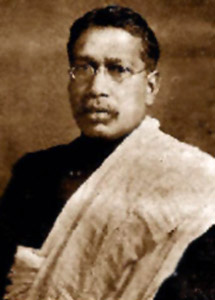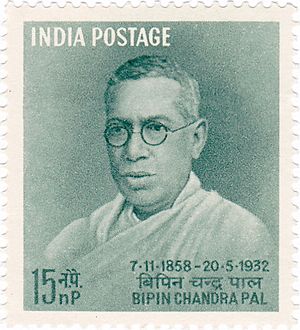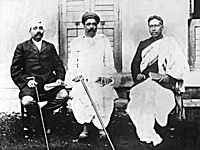Bipin Chandra Pal facts for kids
Quick facts for kids
Bipin Chandra Pal
|
|
|---|---|
 |
|
| Born | 7 November 1858 |
| Died | 20 May 1932 (aged 73) Calcutta (now Kolkata), British India
|
| Nationality | British Indian |
| Alma mater | University of Calcutta |
| Occupation | Politician Writer Indian independence movement activist Orator Social reformer |
| Organization | Brahmo Samaj |
| Political party | Indian National Congress |
| Movement | Indian Independence movement |
| Signature | |
Bipin Chandra Pal (Bengali: বিপিন চন্দ্র পাল ; 7 November 1858 – 20 May 1932) was an important Indian nationalist. He was a writer, speaker, and social reformer. He was also a freedom fighter who worked to make India independent. He was one of the famous "Lal Bal Pal" trio. Pal helped start the Swadeshi movement with Sri Aurobindo. He also spoke out against the division of Bengal by the British government.
Early Life and Beginnings
Bipin Chandra Pal was born in 1858. His village was Poil, in the Habiganj area of British India. He came from a Hindu family. His father, Ramchandra Pal, was a scholar and a small landowner.
Bipin Chandra Pal studied at the Church Mission Society College. This college was part of the University of Calcutta. His son, Niranjan Pal, later helped start a famous film studio called Bombay Talkies.
Pal was very modern in his personal life too. After his first wife passed away, he married a widow. He also joined the Brahmo Samaj, a social reform movement.
Fighting for India's Freedom
Bipin Chandra Pal is known as the Father of Revolutionary Thoughts in India. He was a brave freedom fighter. He became a major leader in the Indian National Congress. In 1887, he strongly asked for the Arms Act to be removed. This law treated Indians unfairly.
Pal was part of the famous "Lal Bal Pal" group. This group included Lala Lajpat Rai and Bal Gangadhar Tilak. They were all known for their strong actions against British rule. Sri Aurobindo Ghosh and Pal were key leaders. They pushed for a new national movement. Their goals included Purna Swaraj (complete self-rule) and the Swadeshi idea.
Pal's plan focused on Swadeshi, boycott, and national education. Swadeshi meant using things made in India. Boycott meant refusing to buy foreign goods. This was to help reduce poverty and unemployment in India. He wanted to remove social problems and make people feel proud of their nation.
He believed in strong action against the British. He did not agree with mild protests. On this point, he had different ideas from Mahatma Gandhi. Pal believed in a more direct approach to freedom.
Pal also worked to fix social problems. He was against the caste system. He supported widows being able to remarry. He also wanted better working conditions for laborers. He asked for a 48-hour work week and higher wages.
As a journalist, Pal wrote for newspapers like Bengal Public Opinion and The Tribune. He also worked for New India. Through his writings, he shared his ideas about nationalism. He wrote articles warning India about global changes. He thought about where future dangers for India might come from.
-
Lala Lajpat Rai from Punjab, Bal Gangadhar Tilak from Maharashtra, and Bipin Chandra Pal (right) from Bengal. This famous trio, known as Lal Bal Pal, changed how the Indian independence movement fought for freedom.



